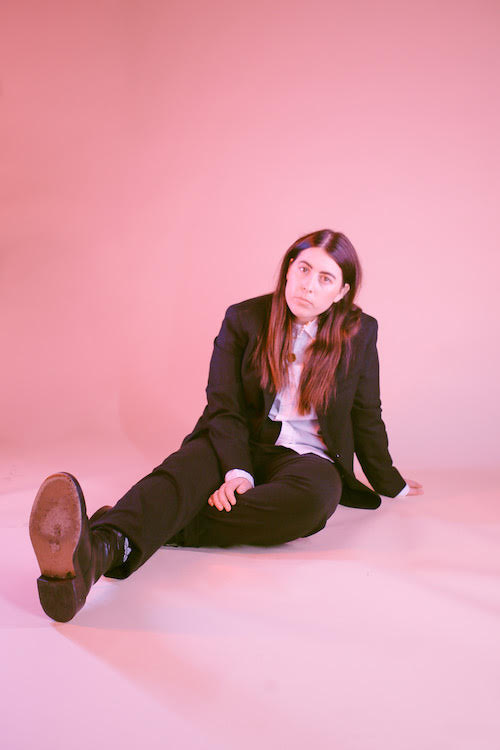Sorcha Richardson Hopes 'Smiling Like an Idiot' Can Be Your Peace in the Dark [Q&A]

As far as pandemic activities go, Sorcha Richardson was able to find one as rewarding and constructive as it gets: writing and recording a full-length album. And while most of it was made over the course of six months spent holed up in her grandparents' house, the record is anything but old-fashioned. Richardson’s sophomore album, Smiling Like an Idiot, finds the Dublin-based singer-songwriter exploring her musical toolbox and stretching her writing and producing wings to create a record that is mature in its lush soundscapes and honest in its poetic portrayals of love, life, and the mortifying ordeal of being known. Blending classically fuzzy indie-rock with moments of ‘80s-oriented synth-pop and a splash of folk instrumentation, Richardson oscillates between brooding and hopeful, providing listeners with a two-way mirror into intimate vignettes of her life that reflect universal feelings of uncertainty, exhilaration, and ultimately, acceptance.
We caught up with Richardson days before the release of her album to talk creative processes, songwriting, and making an album over Zoom.
Ones To Watch: I know that you spent time during the pandemic making this album, so the creative and production process must have been quite different from what you were used to. Could you tell me a little bit about what that looked like?
Sorcha Richardson: So me and my girlfriend moved into [my grandparents’] house, and this was the first half of 2021, so at least in Ireland, nothing was open. It was the most concentrated amount of time I’ve ever spent just writing. My association with my grandparents' house has nothing to do with making music, so it was sort of strange to be in their house with all of their stuff but have my synths set up, and my electric and bass guitar. It was a place that I was so familiar with, but I was using it in a completely new way, which I honestly really enjoyed. My favorite part of the process is probably writing and recording, so to be able to do it completely uninterrupted for six months... I really loved it.
Did being in such a different place for songwriting spur any new ideas, or did you already have an idea of the themes that you wanted to explore?
By the time I moved in there, I had already written a version of a couple different songs. What I’ve learned is that I’m the type of person who can’t help but write about my life. And I write about it in a very concrete, detailed way, so my songs often reflect what my life looks like within the last 12 months. There were a couple of songs I wrote that didn’t make it onto the album that were very much set in that house because I was writing about my life in that house as well, and hopefully they’ll make it onto another release, but I think I just felt like I had room and time.
Your lyrics almost double as little vignettes of your life, and the storytelling you do is well-paired with the sonic elements. Could you tell me a little bit about the production process, especially because I know you produced a couple of tracks yourself?
Eight of the songs were produced by Alex Casnoff. He’s the same producer I worked with on my first album, and even on some of my singles before that, so we’ve worked on so much music together. We did a lot of the initial production for this remotely, he was in LA and I was in Dublin. That was hard (laughs). I think one thing he’s very good at is making my songs exist in their most heightened and most emotional state. On this album, there’s a lot of anxiety, nervousness, and exhilaration, and you can really feel that in the arrangements and the production. I produced “Holiday,” “525,” and I co-produced “Jackpot.” I’ve produced my own stuff before, but never songs on an album, releases that felt like the stakes were a bit lower, but sometimes you just have to take a leap of faith and bet on yourself. Sometimes the best thing about a producer is that they act as a sounding board. It’s not always necessarily the arrangements that they bring, sometimes it's genuinely just them helping you make decisions. I can get very confused about what I want and what I even like, and it’s so much easier to do that when you’re one step removed.
Did you have an idea of what you wanted the end product of this album to sound like, or was it more of a cathartic release of whatever you were feeling in the moment?
I think I had an idea of what it would be, and it’s not that. That’s how it goes for me all the time. I initially thought it would and should be slightly more traditional in how it sounds, in terms of instrumentation, with acoustic guitar, piano, and drums. And then it was like it was calling for something else… we just wanted to meet some of the darkness and weirdness in some of the songs with the darkness and weirdness in the arrangements. Some of the songs have a slight sense of humor about them, and so I didn't want to take the production that seriously either. It was really just a case of following our ideas and impulses, and seeing where I landed. That to me is a more enjoyable way to work as well, just staying open and staying curious about what might happen.
Honestly, that sounds like some themes that I heard in the lyrics too, kind of like a release or reaching a point of acceptance.
Yeah, that’s very true. I think a lot of the album is about learning to make decisions to make yourself happy, that allow you to be happy. That’s where songs like “Shark Eyes” and “Purgatory” and “Stalemate” [come in], where I’m clearly getting it wrong, but I don't know how to change my behaviors, and even the way the album is structured, it starts out kind of dark and there’s a lot of anxiety at the start, and then it arrives at a song like “Smiling Like an Idiot” which closes the album, which is maybe the happiest and the most at ease in itself, and I think that gives me a feeling of “you’ll get there in the end” and you might make a few mistakes along the way, but you can get there if you just keep going.
Do you have any lyrics or songs that are your favorites, or that you’re most proud of?
I really like “Spotlight Television,” there’s a line on “Hard to Fake It,” “Do you think I’m standing in the rain for the good of my health,” which is maybe my favorite lyric on the album. Sometimes it's hard to imbue the way you speak and your personality into lyrics, but I feel like that one does a good job. Then there’s a line in “Good Intentions,” “You were spinning, I was standing still / If I tell you I love you, would that be overkill?” That one to me feels like a space that I’m very familiar with, wanting to do something and be brave and to take a leap of faith but not really knowing if it's safe to jump.
I think the intimacy of your lyrics does a good job of connecting with people wherever they’re at. They’re universal in a way but still maintain that personal aspect.
Yeah, my feelings and emotions are not unique at all, maybe some of the circumstances that led me there are specific to me, but that’s one of the most special things about music; it allows people to not feel so alone in what they’re going through. And there’s a real catharsis in that. Even when I often write very specifically about myself, people hear it and they don’t listen to it and appreciate it because they’re learning about me, I think people enjoy it because they hear themselves in it, and they see their own lives in it, and then people bring their own lives and stories to the songs and fill them with their own meaning, and the song exists somewhere between me and the person listening.
Is there anything you hope that listeners will walk away with after listening to this album?
Writing these songs and making the album is something that gave me a lot of peace, and hope, and I actually think it’s maybe quite a hopeful record. People keep telling me it’s actually kind of dark, but my understanding of it is different. I think my takeaway from it is that you can find happiness and beauty in places you thought you never would, and even if you don’t know that now, it’s almost just like saying “hang in there and everything will be ok.”
What is next for Sorcha Richardson?
I’m very hopeful that I can come play some shows in the States. I also really want to do more writing with other artists and for other artists. I’ve done a bit of it before, but always in between my own stuff, so I wanna do a bit more writing with other people on other projects. I have so many songs that didn’t make this album that I think deserve another look, so I’ll keep working on those as well. But also just go on a holiday to the west of Ireland and go to the pub.
Who are your Ones To Watch?
These questions always stump me, but a girl called Niamh Regan. She supported me on my Irish tour. Also John Francis Flynn is very good, and Izzy Johnson.
Sorcha Richardson's Smiling Like an Idiot is available now.



